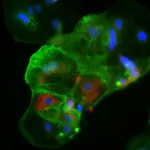People with more empathy more likely to support international sharing of coronavirus vaccines, study shows
2023-07-13
(Press-News.org)
People with more empathy and cosmopolitan beliefs are more likely to support the international sharing of coronavirus vaccines, a new study shows.
During the COVID-19 pandemic, many residents of high-income countries were eligible for COVID-19 vaccine boosters, while many residents of lower-income countries had not yet received a first dose.
Researchers analysed the levels and predictors of international vaccine solidarity through a survey of around 2,000 German adults in the autumn of 2021. They measured their preferences for sharing vaccine supplies internationally versus using that supply as boosters for the domestic population.
Almost half – 48 per cent – prioritised giving doses to citizens in less developed countries. A third of respondents preferred to use available doses as boosters domestically, and a fifth of respondents (19 per cent) did not report a preference.
Respondents were asked: "Coping with the COVID-19 pandemic requires difficult decisions. By the end of September, about 64 percent of people eligible for vaccination had been vaccinated at least once. What do you think is the more important priority now for the use of Germany’s vaccine stocks: offering a third vaccine dose ("booster vaccination") to people in Germany or giving vaccine stocks for first and second vaccine doses to less developed countries?"
The survey was fielded when the number of daily COVID-19 cases was decreasing, but before the Omicron variant was discovered. The supply of booster shots was still limited both within Germany and much more so globally. Booster shots were only available to larger groups of the population later in Germany.
Relative to SPD (Social Democrats) supporters, respondents who identified with the conservative CDU showed less support for international vaccine solidarity. Individuals who identified with the Green Party showed more support for dose sharing.
The study was carried out by Florian Stoeckel, Paula Szewach, Jason Reifler and Jack Thompson, from the University of Exeter, Sabrina Stöckli, from the University of Bern and University of Zurich, Matthew Barnfield from the University of Essex, Joseph B. Phillips from the University of Kent, Benjamin Lyons from the University of Utah, Vittorio Mérola from Durham University
Dr Stoeckel said: “We found that a plurality prefer sharing doses of the COVID-19 vaccine internationally over keeping them in the host country. This highlights that politicians might have some room to manoeuvre and fulfil international vaccine sharing pledges.
“Our result is particularly noteworthy given that international vaccine sharing, at the time of the survey, was not a prominent part of public discourse, which was mostly focused on national vaccine uptake. It is also important to note that almost one in five respondents had no view, leaving room for opinions to crystallise. There seems to be potential for more international vaccine sharing and for communication that increases the salience of the issue, which could mobilize further support.”
Those who scored higher on empathy and those who support domestic redistribution were more inclined to support redistributing vaccines internationally. To the extent that German citizens think about vaccine solidarity, they treated it like a typical foreign aid issue.
Older respondents – the group most at risk to COVID-19 – did not consistently show less support for vaccine solidarity, researchers have found.
Dr Stoeckel said: “We found there is substantial public support among citizens to share doses internationally at least when infection rates are at a modest level and falling. The COVID-19 pandemic is hopefully over, but international inequality when it comes to access to medical supplies is an ongoing global challenge. We hope to contribute to the discussion on ways how these challenges can be addressed.”
END
ELSE PRESS RELEASES FROM THIS DATE:
2023-07-13
Québec, July 13, 2023 – Professor Simona Stäger’s team has made a breakthrough in the study of the human immunodeficiency virus (HIV). The researchers have identified the mechanism by which memory CD4+ T lymphocytes—cells that play a major role in our immune response—are predisposed to cell death in people living with HIV. The team’s findings have just been published in JCI Insight.
In this new study, Professor Stäger and her research team built on work done on mice infected with the Leishmania donovani parasite (published in Cell Reports in 2018), which described how a chronic inflammatory environment predisposes ...
2023-07-13
RICHMOND, Va. (July 13, 2023) — A new study by a Virginia Commonwealth University researcher has found that aggression is not always the product of poor self-control but, instead, often can be the product of successful self-control in order to inflict greater retribution.
The new paper, “Aggression As Successful Self-Control,” by corresponding author David Chester, Ph.D., an associate professor of social psychology in the Department of Psychology at VCU’s College of Humanities and Sciences, was published by the journal Social and Personality Psychology Compass and uses meta-analysis to summarize evidence from dozens of existing ...
2023-07-13
A person’s ‘mindreading ability’ can predict how well they are able to cooperate, even with people they have never met before.
Researchers at the University of Birmingham found that people with strong mind reading abilities – the ability to understand and take the perspective of another person’s feelings and intentions– are more successful in cooperating to complete tasks than people with weaker mind reading abilities.
These qualities, also called ‘theory of mind’, are not necessarily related to intelligence and could be improved through training programmes to foster improved cooperation, for example in ...
2023-07-13
Use of low-dose atropine eyedrops (concentration 0.01%) was no better than placebo at slowing myopia (nearsightedness) progression and elongation of the eye among children treated for two years, according to a randomized controlled trial conducted by the Pediatric Eye Disease Investigator Group (PEDIG) and funded by the National Eye Institute (NEI). The trial aimed to identify an effective way to manage this leading and increasingly common cause of refractive error, which can cause serious uncorrectable vision loss later in life. Results from the trial were published in JAMA Ophthalmology.
Importantly, the findings contradict results from recent trials, primarily in East Asia, which ...
2023-07-13
About The Study: In this randomized clinical trial of school-age children in the U.S. with low to moderate myopia (nearsightedness), atropine, 0.01%, eye drops administered nightly when compared with placebo did not slow myopia progression or axial elongation. These results do not support use of atropine, 0.01%, eye drops to slow myopia progression or axial elongation in U.S. children.
Authors: Michael X. Repka, M.D., M.B.A., of the Wilmer Eye Institute in Baltimore, is the corresponding author.
To access the embargoed study: Visit our For The Media website at this ...
2023-07-13
About The Study: This study provides evidence of the clinical effectiveness of mRNA-based vaccines against COVID-19 in patients with cancer. Longevity of immunity in preventing severe COVID-19 outcomes in actively treated patients with cancer, cancer survivors, and matched controls was observed at least five months after the third or fourth dose.
Authors: Raghav Sundar, M.B.B.S., Ph.D., of the National University Health System in Singapore, and Kelvin Bryan Tan, Ph.D., of the Ministry of Health in Singapore, are the corresponding authors.
To access the embargoed study: Visit our ...
2023-07-13
About The Study: In this survey study, all types of objectively measured visual impairment were associated with a higher dementia prevalence. As most visual impairment is preventable, prioritizing vision health may be important for optimizing cognitive function.
Authors: Joshua R. Ehrlich, M.D., M.P.H., of the University of Michigan in Ann Arbor, is the corresponding author.
To access the embargoed study: Visit our For The Media website at this link https://media.jamanetwork.com/
(doi:10.1001/jamaophthalmol.2023.2854)
Editor’s Note: Please see the article for ...
2023-07-13
RESEARCH REVEALS HOW COVID-19 VIRUS INFECTS THE PLACENTA, AND HOW THIS CAN BE PREVENTED
In a landmark study published in Nature Cell Biology, Australian researchers, led by Professor Jose Polo from Monash University and the University of Adelaide and University of Melbourne’s Professor Kanta Subbarao from the Peter Doherty Institute for Infection and Immunity (Doherty Institute), have revealed how COVID-19 can infect the human placenta.
Research has shown that COVID-19 infections during pregnancy ...
2023-07-13
From Aristotle’s musings on the nature of time to Einstein’s theory of relativity, humanity has long pondered: how do we perceive and understand time? The theory of relativity posits that time can stretch and contract, a phenomenon known as time dilation. Just as the cosmos warps time, our neural circuits can stretch and compress our subjective experience of time. As Einstein famously quipped, “Put your hand on a hot stove for a minute, and it seems like an hour. Sit with a pretty girl for an hour, and it seems like a minute”.
In new work ...
2023-07-13
Two pathologies drive the progression of Alzheimer’s disease. Early on, amyloid beta plaques lead the way, but around the time cognitive symptoms arise, tau tangles take over as the driving force and cognition steadily declines. Tracking the course of the disease in individual patients has been challenging because there’s been no easy way to measure tau tangles in the brain.
But now, researchers at Washington University School of Medicine in St. Louis and Lund University in Lund, Sweden, have identified a form of tau that could serve as a marker to track Alzheimer’s progression. The marker also could be used by Alzheimer’s drug developers to assess ...
LAST 30 PRESS RELEASES:
[Press-News.org] People with more empathy more likely to support international sharing of coronavirus vaccines, study shows




